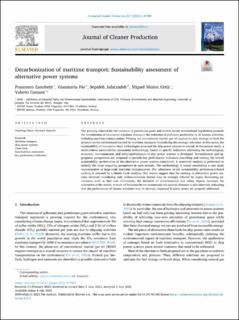| dc.contributor.author | Zanobetti, Francesco | |
| dc.contributor.author | Pio, Gianmaria | |
| dc.contributor.author | Jafarzadeh, Sepideh | |
| dc.contributor.author | Muñoz Ortiz, Miguel | |
| dc.contributor.author | Cozzani, Valerio | |
| dc.date.accessioned | 2024-01-22T09:06:52Z | |
| dc.date.available | 2024-01-22T09:06:52Z | |
| dc.date.created | 2023-09-05T11:17:37Z | |
| dc.date.issued | 2023 | |
| dc.identifier.citation | Journal of Cleaner Production. 2023, 417: 137989. | en_US |
| dc.identifier.issn | 0959-6526 | |
| dc.identifier.uri | https://hdl.handle.net/11250/3112970 | |
| dc.description.abstract | The growing concern for the emission of greenhouse gases and several recent international regulations promote the introduction of innovative solutions aiming at the reduction of pollutant production in all human activities, including maritime transportation. Phasing out conventional marine gas oil engines is a key strategy to limit the pressure on the environment exerted by maritime transport. Considering the strategic relevance of this sector, the sustainability of innovative clean technologies proposed for ship power systems is crucial. In the present study, a multi-criteria sustainability assessment methodology, based on specific indicators addressing the technological, economic, environmental, and safety performance of ship power systems is developed. Normalization and aggregation perspectives are proposed to provide key performance indicators describing and ranking the overall sustainability performance of the alternative power systems considered. A sensitivity analysis is performed to identify the most impacting parameters in each domain. The methodology is tested considering a case study representative of large-scale maritime transportation. The robustness of the sustainability performance-based ranking is assessed by a Monte Carlo analysis. The results suggest that the ranking of alternative power systems obtained considering only techno-economic factors may be strongly affected by highly fluctuating parameters, such as fuel cost. Conversely, the inclusion of environmental and safety aspects increases the robustness of the results. A trade-off between the environmental and societal domains is also observed, indicating that the performance of cleaner solutions may be strongly improved if safety issues are properly addressed. | en_US |
| dc.language.iso | eng | en_US |
| dc.publisher | Elsevier | en_US |
| dc.rights | Attribution-NonCommercial-NoDerivatives 4.0 Internasjonal | * |
| dc.rights.uri | http://creativecommons.org/licenses/by-nc-nd/4.0/deed.no | * |
| dc.title | Decarbonization of maritime transport: Sustainability assessment of alternative power systems | en_US |
| dc.title.alternative | Decarbonization of maritime transport: Sustainability assessment of alternative power systems | en_US |
| dc.type | Peer reviewed | en_US |
| dc.type | Journal article | en_US |
| dc.description.version | publishedVersion | en_US |
| dc.rights.holder | © 2023 The Authors. Published by Elsevier. | en_US |
| dc.source.pagenumber | 15 | en_US |
| dc.source.volume | 417 | en_US |
| dc.source.journal | Journal of Cleaner Production | en_US |
| dc.identifier.doi | 10.1016/j.jclepro.2023.137989 | |
| dc.identifier.cristin | 2172441 | |
| dc.source.articlenumber | 137989 | en_US |
| cristin.ispublished | true | |
| cristin.fulltext | original | |
| cristin.qualitycode | 2 | |

